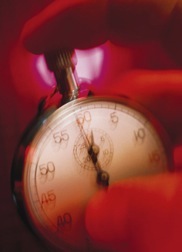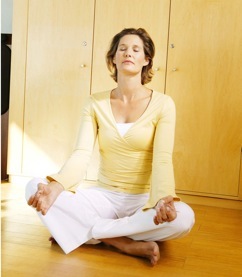-
Mental Health Conditions












Anxiety & Panic Attacks
Anxiety is a feeling of dread, fear, or distress. This can be from a real threat or one that exists in the mind. A panic attack is a brief period of acute anxiety that comes on all of a sudden. It occurs when there is no real danger. It comes without warning.
Signs & Symptoms
-
•Rapid pulse and/or breathing rate. Racing or pounding heart.
-
•Dry mouth. Sweating. Trembling.
-
•Shortness of breath. Faintness.
-
•Numbness and tingling of the hands, feet, or other body part.
-
•Feeling of a “lump in the throat.”
-
•Stomach problems.
-
•Sleep problems.
A panic attack lasts only a few minutes, but seems to last for hours.
Psychological counseling is one method of treatment for anxiety.














Eat meals at regular times.
Meditate to help you deal with anxiety.

Persons having a panic attack may rush to an emergency room. Why? They think they are having a heart attack. They feel like they are going crazy or going to die.
Persons who have repeated panic attacks begin to avoid places they link with past attacks. If the person had the panic attack in a grocery store and had to leave the store to feel safe, the person avoids going to the grocery store. This can lead to a phobia called agoraphobia.
A person who has 4 or more panic attacks in any 4 week period could have panic disorder. The disorder can also be present if the person has less than 4 panic attacks in 4 weeks, but fears having another one.
Causes
Some anxiety is normal. It can alert you to seek safety from physical danger. Anxiety is not normal, though, when it overwhelms you and interferes with day-to-day life. Anxiety can be a symptom of many conditions. These include:
-
•Having too much caffeine. Withdrawal reaction from nicotine, alcohol, caffeine, drugs, or medicines, such as sleeping pills.
-
•A side effect of some medicines.
-
•Low blood sugar.
-
•An overactive thyroid gland.
-
•Cushing’s Syndrome. With this, the glands above the kidneys called the adrenal glands, make too much of a hormone.
Anxiety can also be a symptom of illnesses known as anxiety disorders. These include:
-
•Phobias.
-
•Panic disorder.
-
•Obsessive-Compulsive Disorder (OCD). With this, a person has persistent, involuntary thoughts or images (obsessions). The person also does ritualistic acts, such as washing the hands, according to certain self-imposed rules (compulsions).

Treatment
Anxiety disorders are common problems. They often respond to treatment.
When anxiety is mild and/or does not interfere with daily living, it can be dealt with using self-care measures. Treatment also includes:
-
•Treating any medical condition which causes the anxiety or panic attacks.
-
•Medication.
-
•Counseling.
-
•Self-help groups for anxiety disorders.
Questions to Ask

Self-Care / Prevention
-
•Look for the cause of the stress that results in anxiety. Deal with it. Use stress management techniques. Do deep breathing exercises. Meditate.
-
•Lessen your exposure to things that cause you distress.
-
•Talk about your fears and anxieties with someone you trust, such as a friend, partner, teacher, etc.
-
•Exercise regularly (e.g., 30 minutes to 1 hour, 5 times a week).
-
•Eat healthy foods. Eat at regular times. Don’t skip meals.
-
•If you are prone to low blood sugar episodes, eat 5 to 6 small meals per day instead of 3 larger ones. Avoid sweets on a regular basis, but carry a source of sugar with you at all times, such as a small can of orange juice. This will give you a quick source of sugar in the event that you get a low blood sugar reaction.
-
•Limit or avoid caffeine intake after noon.
-
•Avoid nicotine and alcohol.
-
•Avoid medicines that stimulate. Examples are over-the-counter diet pills and pills to keep you awake.
-
•Do some form of relaxation exercise daily. Examples are meditation and deep breathing.
-
•Plan your schedule for what you can handle both physically and mentally.
-
•Rehearse for planned events that have made you feel anxious in the past or that you think will cause anxiety. Imagine yourself feeling calm and in control during the event. Do this several times before it really occurs.
-
•Face the fear. Accept it, don’t fight it. (This may need outside help.)
-
•Be prepared to deal with symptoms of anxiety. For example, if you have hyperventilated in the past, carry a paper bag with you. If you do hyperventilate, cover your mouth and nose with the paper bag. Breathe into the paper bag slowly and rebreathe the air. Do this in and out at least 10 times. Remove the bag and breathe normally a few minutes. Repeat breathing in and out of the paper bag as needed.
-
•Help others. The positive feelings from this can help relieve some of your anxiety.
-
•Read self-help books on anxiety, panic attacks, etc.
With anxiety, do you have any of these problems?
-
•Extreme shortness of breath without chest pain.
-
•Feeling lightheaded. Passing out.
-
•Suicide attempts or plans.
With the anxiety, do you have these problems?
-
•Excessive hair growth.
-
•Round face and puffy eyes.
-
•Skin reddens, thins, and has stretch marks.
-
•High blood pressure.
With the anxiety, do you have signs and symptoms of hyperthyroidism or of posttraumatic stress disorder?
Do you have anxiety only at these times?
-
•When you don’t eat or when you do too much physically, especially if you are a diabetic.
-
•During the 2 weeks before your menstrual period, if you are female.
Do you get anxiety only after taking an over-the-counter or prescribed medicine or after withdrawing from medication, nicotine, alcohol, or drugs?
Does anxiety keep you from doing the things you need and like to do every day?
Have you had any of these problems?
-
•Panic attacks and you have had fears of getting another one for 1 month or longer.
-
•Worry about what would happen with another panic attack.
-
•A change in what you do related to panic attacks. You avoid places, are not able to leave the house, or are afraid to be left alone.
Do any of the following keep you from doing daily activities?
-
•You check something over and over again, such as seeing if you’ve locked the door, even though it is locked.
-
•Repeated, unwanted thoughts, such as worrying you could harm someone.
-
•Repeated, senseless acts, such as washing your hands over and over again.



Get more information from:
HealthyLearn® | www.HealthyLearn.com. Click on MedlinePlus®.
Agoraphobics in Motion (AIM) | www.aim-hq.org
Anxiety Disorders Assoication of America | www.adaa.org
Mental Health America (MHA) | 800.969.6642 | www.mentalhealthamerica.net





Copyright © 2009, American Institute for Preventive Medicine. All rights reserved.